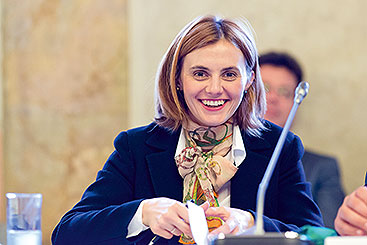Presidency 2013: Bosnia and Herzegovina – diversity for the river basin

In its continuing series, Danube Watch presents portraits of the leaders whose passion and commitment help determine the future of our river basin. In this issue, we speak to the ICPDR President for 2013, Deputy Minister Ermina Salkičević-Dizdarević.

“I will focus on harmonising the diversity that characterises the region shared by 19 states and over 81 million people, people from different language families, landscapes and culture. This diversity is not the region’s weakness but, on the contrary, its advantage.”
High-level representatives from the Danube Basin countries, observer organisations and the corporate world of the Business Friends of the Danube joined outgoing president Wolfgang Stalzer as he presented a bottle of Danube water to Ermina Salkičević-Dizdarević on 15 January 2013. Through this ceremony, the ICPDR Presidency for 2013 has been passed to Bosnia and Herzegovina.
Danube Watch: What activities will mark your
presidency?
Ermina Salkičević-Dizdarević: The current crisis seen
in the fields of finance, energy and the environment
reinforce the idea that sustainable and effective solutions
can be found at the regional level. I will focus on
harmonising the diversity that characterises the region
shared by 19 states and over 81 million people, people
from different language families, landscapes and culture.
This diversity is not the region’s weakness but,
on the contrary, its advantage.
During the presidency of Bosnia and Herzegovina,
one of our priorities will be the successful finalisation
of the Joint Danube Survey 3, the main objective of
which will be to produce highly comparable and reliable
information on water quality and pollution.
I will also emphasise activities such as: finalising guiding
principles for the development of hydropower in
the Danube Basin which balance environmental and
economic needs; continuing to work towards balancing
the needs of the environment and the economy in
the management of inland navigation; implementing measures laid down in the
climate change adaptation
strategy for the Danube
Basin and continuing to cooperate
with other international
water organisations.
I plan to continue developing the policy lines that have already been initiated and to follow the positive experiences made during Austria’s presidency. The great advantage of the ICPDR is the fact that the Secretariat is a permanent body which guarantees continuity and ongoing support.
Danube Watch: Coming
from both a Danube
and Sava country, how do
you see the coordination
between the Sava Commission
and the ICPDR?
Ermi na Salkičević-Dizdarević:
The Sava River is the biggest
tributary of the Danube
River by water content. The
condition of this water has
a perceptible influence on settlements, transport, agriculture,
energy and industrial development. From its
beginning in 2002, the International Sava River Basin
Commission – with our fellow Member States Croatia,
Montenegro, Serbia and Slovenia – has promoted cooperation
with the Secretariat of the ICPDR, the Danube
Commission and the United Nations Economic Commission
for Europe. The Commission has tackled issues
which are of crucial importance for transboundary
development in the Sava River Basin; examples of this
are the 2008 feasibility study for reconstruction and
development of inland navigation in the Sava River
Basin, the 2009 protocol on water pollution caused by
navigation, the 2010 protocol on flood protection and
the Sava River Basin Management Plan in 2012.
The experiences and results of the Sava initiative represent a good model for the Danube. By working on these complex issues, the Sava countries have learned how to develop the measures for the EU Strategy for the Danube Region. I believe that the International Sava River Basin Commission is approaching the next step that will provide the additional push to the Danube Strategy.
Danube Watch: 2013 is the UN’s ‘International Year
of Water Cooperation’ – what is the significance of the ICPDR in fostering international cooperation on
water?
Ermina Salkičević-Dizdarević: The ICPDR is a
positive, internationally recognised example of cooperation
in a transboundary river system. The ICPDR
acknowledges that countries cannot solve water issues
alone; they need to cooperate with business.
The Danube countries have been doing so through
cooperation arrangements with the ICPDR’s Business
Friends of the Danube.
The countries of the Danube have historically benefitted from support from international organisations and have a sense of obligation to share their experience with other river basins. A good example of this is the twinning arrangement with our colleagues from the Orange Senqu River Commission (ORASECOM) in Southern Africa where both commissions can learn and profit from each other.
Implementation of agreements such as the Danube Protection Convention, as well as the EU Water Framework Directive and the EU Flood Directive are the reason why the ICPDR is a bright example for all water organisations. We are all working to achieve international cooperation in the conservation of our planet’s natural heritage – which we have only borrowed from future generations.
Ermina Salkičević-Dizdarević, ICPDR President 2013
Since 2012
Ministry for Foreign Trade and Economic
Relations,
Deputy Minister
2007-2012
Raiffeisen Bank Bosnia and Herzegovina
Relationship Manager
2002 – 2006
ASYCUDA-UNCTAD Project Coordinator
EU Customs and Fiscal Assistant
Since 2004
University of Sarajevo, Department of Marketing
Master thesis in progress
2001
Georgetown University, Washington DC
Certificate of ‘American Political and Economic
System of Organization’
1997 – 2002
University of Sarajevo, Department of International
Economics, Bachelor Degree in Economics





